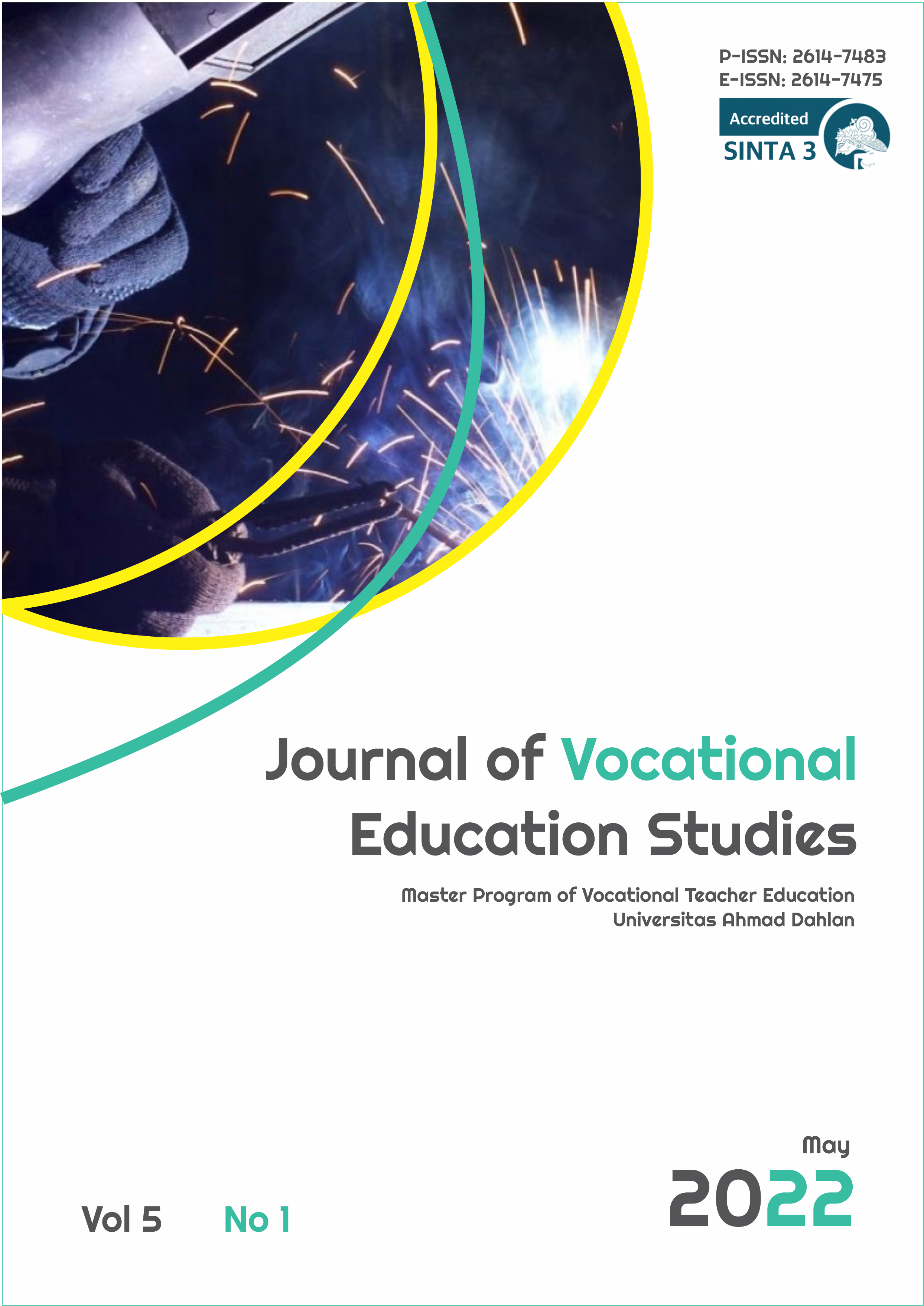Implementation of Teaching Factory (TEFA) in Vocational School to Improve Student Work Readiness
DOI:
https://doi.org/10.12928/joves.v5i1.5922Keywords:
Teaching factory, TEFA, Students work-readinessAbstract
This research aims to find out the influence of teaching factory implementation on student work-readiness at SMKN 2 Singaraja. The type of research used is qualitative descriptive to find out phenomena related to the implementation of teaching factory. Interview, observation, and documentation methods are used to obtain data. Validity of data used in this study is the triangulation of sources. Data analysis is done in a way; (1) Data Reduction, (2) Presentation, and (3) Conclusion Drawing (Verification) after obtaining data on the ground. Results of this study showed that implementation of the teaching factory at SMKN 2 Singaraja has been quite good in terms of facilities, infrastructure, and industry involvement in the planning of TEFA activities. However, the TEFA implementation system implemented is less able to support student’s readiness, so there needs to be learning application models in implementation of TEFA that can improve student’s ability to think critically, and have a positive influence on work readiness supporting factors in students.
References
Ali, M., & Koehler, T. (2020). Evaluation of indonesian technical and vocational education in addressing the gap in job skills required by industry.
Bang, Y., & Park, T. (2021). Needs analysis in technical vocational education and training (TVET ) programs for sustainable development of women in cambodian hair and beauty industry. Journal of Technical Education and Training, 13(3), 115–124.
Cholik, M., & Soeryanto. (2020). Model teaching factory based local advantages in smk. International Journal of Advanced Science and Technology, 29(05), 1279–1286.
Dewi, S. S., & Sudira, P. (2018). The contribution of teaching factory program implementation on work readiness of vocational high school students in makassar. Journal of Educational Science and Technology (EST), 4(2), 126–131.
Hashim, S., Hishamuddin, M., Rahman, A., Nincarean, D., Jumaat, N. F., & Utami, P. (2019). Knowledge construction process in open learning system among technical and vocational education and training ( TVET ) practitioners. Journal of Technical Education and Training, 11(1), 73–80.
Ismayati, E., Muslim, S., Kusumawati, N., Rahmadyanti, E., & Hilmi, M. A. (2020). Critical study of research results about tvet and tefa’s role in social , economic , and education development in the country. Journal of Education, Teaching, and Learning, 5(1), 106–113.
Kanwar, A., Balasubramanian, K., & Carr, A. (2019). Changing the TVET paradigm : new models for lifelong learning. International Journal of Training Research, 17(1), 54–68.
Kusumojanto, D. D., & Wulandari, A. (2021). Does teaching factory matter for vocational school students?. Journal Pendidikan Bisnis dan Manajemen, 6(3), 146-155.
Mavrikios, D., Georgoulias, K., & Chryssolouris, G. (2018). The teaching factory developments and outlook. Procedia Manufacturing, 23, 1–6.
Mourtzis, D, Vlachou, E., Dimitrakopoulos, G., & Zogopoulos, V. (2018). Cyber- physical systems and education 4.0 – the teaching factory concept 4.0. Procedia Manufacturing, 23, 129–134.
Mourtzis, Dimitris. (2018). Development of skills and competences in manufacturing towards education 4.0 : a teaching factory approach. Springer International Publishing. 194-120.
Müller-frommeyer, L. C., Aymans, S. C., & Bargmann, C. (2017). Introducing competency models as a tool for holistic competency development in learning factories : Challenges , example and future application. Procedia Manufacturing, 9, 307–314.
Pradipta, B. Q., Hirawan, F. B., & Ragamustari, S. K. (2021). Evaluation of policy in the vocational education system revitalization in Indonesia : Examining the teaching factory radiness of industry. Jurnal Pendidikan Vokasi, 11(1), 68–77.
Riadi, S., Triono, S., Syahril, S., & Nofriansyah, D. (2019). Effectiveness of metacognitive learning’s model in engineering. International Journal of Engineering and Advanced Technology, 9(1), 4438–4443.
Rohman, F. (2020). The Development of teaching factory module to increase the interest in entrepreneurship through competency based training model in central java state vocational school. Journal of Vocational Career Education, 5(2), 89–102.
Schröder, T. (2019). A regional approach for the development of TVET systems in the light of the 4th industrial revolution : the regional association of vocational and technical education in Asia association of vocational and technical education in Asia. International Journal of Training Research, 17(1), 83–95.
Sudira. (2017). TVET abad xxi filosofi, teori, konsep, dan strategi pembelajaran vokasional. Yogyakarta: UNY Press.
Sugiyono. (2013). Metodologi penelitian kuantitatif kualitatif R&D. Bandung: UNY Alphabeta.
Wahjusaputri, S., Marlina, E., Latifah, S., & Timur, K. J. (2020). Developing the teaching factory learning media in a public vocational high school. Jurnal Pendidikan Vokasi, 10(1), 69–79.
Zutiasari, Ika., Rahayu, Wening Patmi., Martha, Jefry Aulia., & Zumroh, Siti. (2021). Integrasi pendidikan bisnis dengan teaching factory dan pengaruhnya terhadap kesiapan bekerja siswa smk. Jurnal Inovasi Pendidikan Ekonomi, 11(1), 21–32.
Downloads
Published
Issue
Section
License
Copyright (c) 2022 Universitas Ahmad Dahlan

This work is licensed under a Creative Commons Attribution-ShareAlike 4.0 International License.
Authors who publish with Journal of Vocational Education Studies (JOVES) agree to the following terms: Authors retain the copyright and grant the Universitas Ahmad Dahlan right of first publication with the work simultaneously licensed under a Creative Commons Attribution License (CC BY-SA 4.0) that allows others to share (copy and redistribute the material in any medium or format) and adapt (remix, transform, and build upon the material) the work for any purpose, even commercially with an acknowledgement of the work's authorship and initial publication in Universitas Ahmad Dahlan. Authors are able to enter into separate, additional contractual arrangements for the non-exclusive distribution of the journal's published version of the work (e.g., post it to an institutional repository or publish it in a book), with an acknowledgement of its initial publication in Universitas Ahmad Dahlan. Authors are permitted and encouraged to post their work online (e.g., in institutional repositories or on their website) prior to and during the submission process, as it can lead to productive exchanges, as well as earlier and greater citation of published work (See The Effect of Open Access).










.png)



